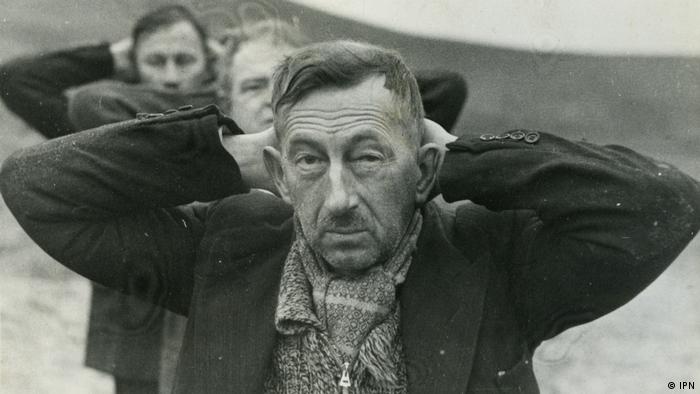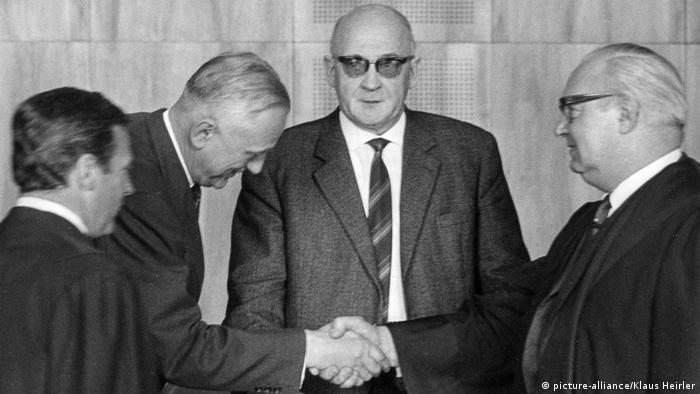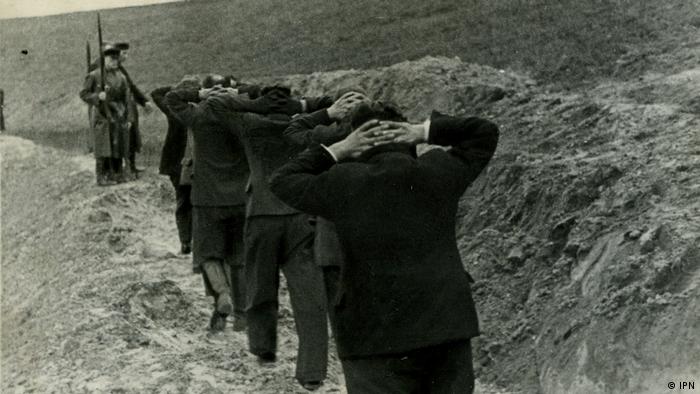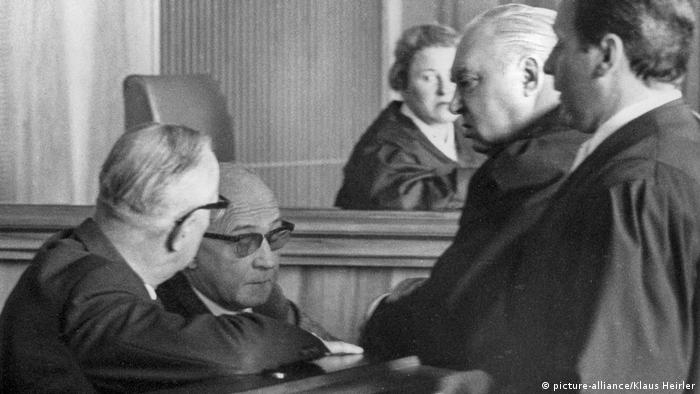As the Remains of Władysław Bieliński in a mass grave were found, returned one of the perpetrators, Jacob Lölgen, as a respected citizen in the German society. He was never punished for deeds in Poland.

Maria chose the warmest sweater. The zipper and collar. They feared that it would be Władysław cold. The autumn was always uncomfortable. She approached the fence of the Bromberger barracks at the Danziger Straße, which had been renamed the German in Adolf-Hitler-Straße. She gave her husband the clothes. They exchanged a few words. For more there was no time. The guards of the Germans established an internment camp, drove the family of the Detained teacher, quickly. It was the 31. October 1939.
Eight years later, Mary looks at the clay bonded sweater. She recognizes the jacket. You know: It is the of Władysław. His body was recovered with those of other Victims from the earth. Only 40 of the 350 Murdered could be identified.
A black-and-white photo
Today Władysławs members would know nothing about his fate. After the war she chanced upon a photo of the Władysławs Bieliński shortly before his death.
On the black-and-white photo, Władysław, and clasped his hands behind his head. He’s wearing the sweater that had brought Mary to him, and a jacket. Two other men are visible behind him. They all die by head shots. The Germans buried in trenches in the Bydgoszcz district of Fordon, later the valley of death called. It happened on 1. November 1939.

Acquittal of Jacob Lölgen (center) at the 1. April 1966.
“Only my grandmother my grandfather in the picture looked, she knew that he is dead. The Germans didn’t want to tell her where he was buried. They lied that he had been brought to Germany to work. I know the last photo of my grandfather since my Childhood. It is tragic, shocking. To this day, it evokes great emotion in me. Because it shows the face of a man who knows what is going to happen in the next Moment with him,” says Marek Bieliński, Professor at the University of technology and life Sciences in Bydgoszcz (Bromberg).
While the family grieved the loss of Władysław Bieliński, employed the court of the internment camp Lölgen in the West German Recklinghausen with Jacob, a fifty-year-old officer in the German secret police. He was convicted of belonging to the Gestapo to pay a fine of 2000 marks.
But he had nothing to pay. It held the one-year internment for a sufficient punishment. The provisional court, which was under the supervision of the allied occupying powers, did not know that it was Lölgen, the Władysław Bieliński and over 300 other innocent inhabitants of Bydgoszcz sent in the death.
“Action Intelligence”
In 1938, Jacob was Lölgen as chief inspector of the Gestapo in Danzig sent. In September of the following year, delegated to him, according to Bromberg. He was commander of the local unit of einsatzkommando 16, whose task is the persecution and murder of the local management layers.
The leaders of the third Reich wanted to liquidate the Polish Elite. Did you know that this would prevent you from tearing the full control over Poland to make the poles slaves in the service of the German “master race” to. Therefore, were killed from the first days of the war, in the framework of the so-called intelligence action scientists, teachers, lawyers, Doctors and officials in occupied Poland. According to estimates, were murdered in the first months of the war about 60,000 people.
The Lölgen in Bydgoszcz, led squad 16 with 349 people on the Conscience. This number was Lölgen in its Reports. In one he wrote about the period from 22. up to 29. October: “The against the Polish intelligence, initiated action is as good as completed. Of the Polish intelligence and as a German hater and Hetzer against the Germans bulging people, 250 have been in the course of the last week liquidated.”

“Action intelligence” – Polish civilians on the way to his execution.
After the war, Lölgen returned to Germany in December 1949, he was denazified. He began his work in the police again. He was head of the criminal police in the Rhineland-Palatinate, Trier, and remained until March 1957, in the office. After that, he went at the age of 60 years in retirement.
Line of defense
The justice of the Federal Republic of Germany initiated the mid-1960s, in Munich, a court Lölgen proceedings against Jacob, and his well-Known from bromberger times, Horst Eichler,. They were accused of complicity in the murder of 349 Poland.
Lölgen claimed he didn’t want to get in on the action in Bydgoszcz to participate, and his supervisor Rudolf Tröger repeatedly prompted to send him to Danzig, or to the Front. This got rejected. In one of the talks have Tröger said that Lölgen will not be sent to a concentration camp if he followed the instructions.
The verdict: it’s a shame!
Lölgen admitted that he knew that people had been shot without trial or conviction. He, however, claimed that he had never participated in the executions, and the decision about who should be killed, had been taken by his superiors Tröger. He had only given commands.
The court in Munich found that no sufficient evidence was presented to lay the access. On 1. In April 1966, he was acquitted. Dieter Schenk, the author of important publications about the crimes of the Germans in Poland, called a disgrace to the judiciary. Schenk refers to the findings of the state justice administration for the investigation of national socialist crimes in Ludwigsburg and doubts that Lölgen would actually have been in danger if he had refused to follow the orders.
Grandpa Jacob
“I have him perceived as being very warm, he always made jokes, I’ve always felt when I was with him. When I was a kid, we played with the hands so, one on top of the Hand, then the other, etc. Lölgen up, under a lot of shouting, the tower will then be terminated”, – told the grandson of Jacob.
He asks not to give his real name in the Text, that’s why he’s here Andreas. “You don’t want to be associated with it, in Germany and elsewhere not,” he explains.
Andreas has recently started to deal with the biography of his grandfather, which for him was always just grandpa. “At the beginning I was shocked, I tried to understand what obeying orders means. It was this construction that was related before the court. I tried to understand, whether it was in fact a danger to life and limb to refuse a command. How was the Situation at that time? What is the impact you had on people? I think I’ve been trying to find excuses for him. But the facts were clear.”

Jacob Lölgen (second from the left): After the acquittal of a police career in Trier.
Andreas’ family has barely spoken about the Second world war and the use of the grandfather in Poland. “I think the family was always afraid that the story comes up again. That’s why you didn’t tell us kids anything, probably, so that we can giveaway to us. The whole thing is a blemish to the family.”
Andreas knows that a process against Jacob Lölgen today, otherwise could end: “It is clear to me that the former judges were people with a Nazi past.”
Epilogue
Jacob Lölgen was not punished. After Retirement, he led Westphalia, a quiet life in North Rhine-Westphalia. He was active as a volunteer in the Volksbund of German war graves care. The last years of his life he spent in a senior citizens home in Brühl, near Bonn, where he died on may 5. August, 1980 passed away.
Marek Bieliński has taken his grandfather never. He has a couple of souvenir. “I inherited the Desk, the inkwell, and the seal with the initials WB.” Most of the personal items Bielińskis, such as the great library, burned by the Germans. In 1947, a funeral was organized for those who died in Bydgoszcz valley of the dead. Władysław Bieliński was buried on the “hill of liberty” beige.
From the documentary series “guilt without punishment”. A project by DW-Polish-with Interia and Wirtualna Polska. dw.com/zbrodniabezkary